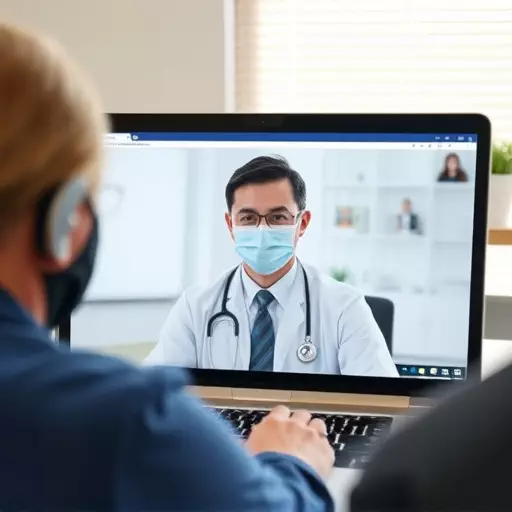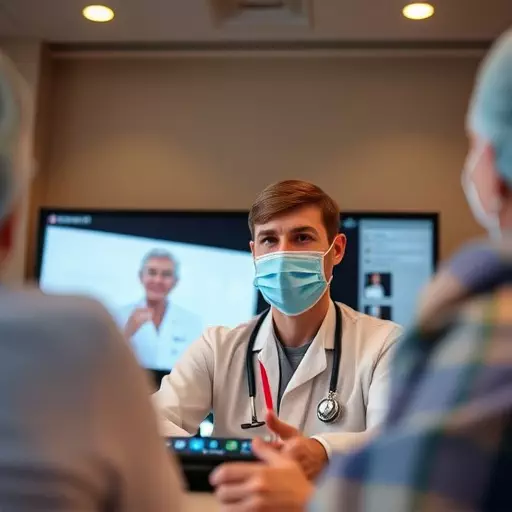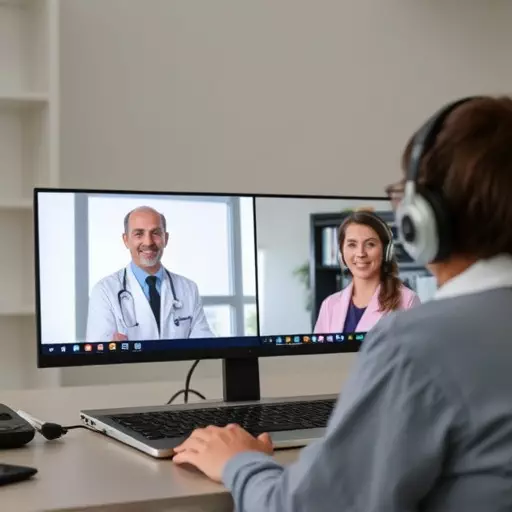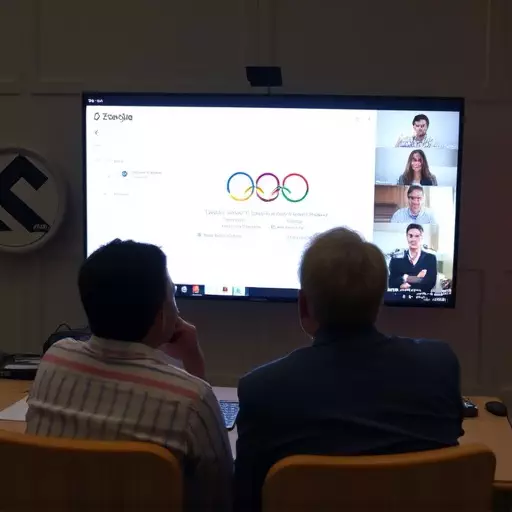In Detroit-Livonia-Dearborn, cultural sensitivity is paramount for successful telehealth Ozempic consultations. Healthcare providers must be trained to understand and cater to diverse communication styles, language preferences, and health practices among various ethnic groups. Preparation includes asking relevant questions and addressing common concerns about medication management, side effects, and privacy. By offering translation services, culturally relevant education, and sensitively answering queries in plain language, providers create an inclusive environment for patients from all backgrounds. Effective follow-ups ensure a seamless transition to ongoing care, building trust and improving patient satisfaction.
In the digital age, telehealth services like Ozempic consultations in Detroit-Livonia-Dearborn are becoming increasingly prevalent. However, navigating cultural sensitivities in these virtual settings presents unique challenges. This article explores strategies to ensure inclusive and effective care. We delve into understanding diverse patient backgrounds, training for culturally competent consultations, and implementing secure communication practices. By addressing common concerns and questions, we aim to guide healthcare providers in preparing for virtual Ozempic consultations, fostering trust, and delivering quality care to a diverse patient population.
- Understanding Cultural Sensitivities in Telehealth Settings
- The Importance of Training for Virtual Ozempic Consultations
- Creating an Inclusive Environment for Diverse Patients
- Common Concerns and Questions from Patients in Detroit-Livonia-Dearborn Area
- Effective Communication Strategies for Telehealth Sessions
- Ensuring Patient Privacy and Confidentiality During Virtual Consultations
- Post-Consultation Follow-Up: Building Trust and Continuous Care
Understanding Cultural Sensitivities in Telehealth Settings

In the realm of telehealth Ozempic consultations detroit-livonia-dearborn, understanding cultural sensitivities is paramount to ensuring effective and respectful communication. Given the diverse makeup of communities in these metropolitan areas, healthcare providers must prepare for virtual ozempic consultation sessions by acknowledging potential cultural differences that may impact patient experiences and preferences. This includes being aware of varying communication styles, language barriers, and unique health beliefs or practices specific to different ethnic and socio-cultural groups.
Preparing for a virtual ozempic consultation involves asking the right questions to gain insights into patients’ backgrounds and tailor care accordingly. Common questions answered during telehealth sessions may include inquiries about cultural traditions affecting diet and lifestyle, preferred languages for communication, and any concerns regarding privacy or trust in virtual healthcare settings. By addressing these aspects proactively, healthcare providers can foster a sense of comfort and build stronger connections with patients from diverse backgrounds, enhancing the overall quality of care provided during these consultations.
The Importance of Training for Virtual Ozempic Consultations

In the realm of healthcare, especially with the rise of telehealth, effectively addressing cultural sensitivities is paramount. For cities like Detroit-Livonia-Dearborn where diverse communities thrive, preparing for virtual Ozempic consultations requires a nuanced approach to ensure every patient feels heard and respected. Training sessions play a pivotal role in this process. These sessions equip healthcare providers with the skills to navigate cultural nuances, understand potential barriers, and anticipate common questions that may arise during telehealth sessions. By delving into topics such as cultural competence, language access, and unconscious biases, practitioners become more adept at delivering patient-centered care.
During these training programs, medical professionals are often exposed to a tapestry of experiences and perspectives, enabling them to address specific concerns related to telehealth Ozempic consultations in Detroit-Livonia-Dearborn’s diverse population. Common questions, such as those regarding medication management, side effects, and access to care, may be answered with cultural sensitivity, fostering an environment where patients feel comfortable discussing their health issues openly. Ultimately, this preparation empowers healthcare providers to facilitate meaningful conversations, dispel misconceptions, and offer tailored guidance during virtual consultations.
Creating an Inclusive Environment for Diverse Patients

Creating an inclusive environment is paramount when conducting telehealth Ozempic consultations in Detroit-Livonia-Dearborn and beyond. It ensures that patients from diverse backgrounds feel welcomed, understood, and respected during their virtual interactions with healthcare providers. Before initiating these consultations, it’s essential to prepare by considering cultural sensitivities and language accessibility. This might involve offering translation services for non-English speakers or incorporating culturally relevant educational materials to better engage all patients.
During telehealth sessions, addressing common questions regarding medication administration, potential side effects, and dietary considerations with a diverse patient base requires sensitivity and adaptability. Healthcare providers should be equipped to explain medical concepts in plain language, avoiding jargon that might confuse some individuals. Additionally, recognizing and respecting personal beliefs and practices related to healthcare is vital. By fostering an inclusive atmosphere and being attuned to these sensitivities, telehealth Ozempic consultations can become more accessible and effective for all patients, regardless of their cultural or linguistic background.
Common Concerns and Questions from Patients in Detroit-Livonia-Dearborn Area

Many patients in the Detroit-Livonia-Dearborn area, when preparing for their first telehealth Ozempic consultation, have similar concerns and questions. These often revolve around understanding the medication’s role in managing type 2 diabetes, especially within a virtual setting. Common queries include inquiring about the efficacy of remote consultations, asking how telehealth can effectively address individual needs, and seeking reassurance regarding privacy and security during digital interactions.
Another frequent topic is learning about potential side effects and how to manage them, particularly when transitioning from in-person to virtual care. Patients want to know what to expect during the consultation process, including time frames and any necessary preparations. Answering these questions comprehensively ensures patients feel empowered and ready for their virtual Ozempic consultations, fostering a positive telehealth experience.
Effective Communication Strategies for Telehealth Sessions

Effective communication strategies are essential when conducting telehealth Ozempic consultations in Detroit-Livonia-Dearborn and beyond. Preparing for a virtual consultation involves ensuring clear and concise language, as well as being culturally sensitive to the diverse backgrounds of patients. Before the session, familiarize yourself with the patient’s cultural background, preferences, and potential language barriers. This allows you to adjust your communication approach accordingly, making the experience more comfortable for the patient.
During telehealth sessions, answering common questions openly and patiently is crucial. Address concerns regarding privacy, technical issues, or the use of video conferencing platforms honestly and with reassurance. Providing step-by-step guidance on using the necessary technology and explaining the benefits of virtual consultations can help alleviate anxiety. Effective communication in this setting involves active listening, clear explanations, and creating a supportive environment despite the distance.
Ensuring Patient Privacy and Confidentiality During Virtual Consultations

In the realm of telehealth Ozempic consultations Detroit-Livonia-Dearborn, patient privacy and confidentiality are paramount. When engaging in virtual consultations, it’s crucial to establish a secure digital environment to protect sensitive healthcare information. Patients must feel confident that their discussions with medical professionals remain confidential, especially when discussing intimate health matters related to chronic conditions like diabetes.
Preparing for a virtual Ozempic consultation involves ensuring both technological and informational readiness. Common questions answered during telehealth sessions often revolve around privacy measures, access to secure platforms, and understanding how data is handled. Medical practices should provide clear guidelines on what patients can expect regarding their privacy, including the encryption of data transmission and secure storage of medical records, thereby fostering trust and ensuring a comfortable consultation experience.
Post-Consultation Follow-Up: Building Trust and Continuous Care

After each telehealth Ozempic consultation in Detroit-Livonia-Dearborn, a crucial step is taken to foster continuous care and build trust with patients – the post-consultation follow-up. This process involves reaching out to patients to address any lingering questions or concerns, ensuring they feel heard and supported even after the virtual meeting has ended. During these check-ins, healthcare providers can offer personalized guidance tailored to each patient’s unique needs and cultural background.
By engaging in this proactive approach, healthcare professionals can enhance the overall patient experience, particularly for those who might face challenges navigating virtual platforms or have specific cultural considerations. Preparing for these follow-ups by anticipating common questions and having resources ready ensures a seamless transition from consultation to ongoing care. This strategy not only improves patient satisfaction but also strengthens the relationship between caregivers and their patients in the context of telehealth Ozempic consultations.
